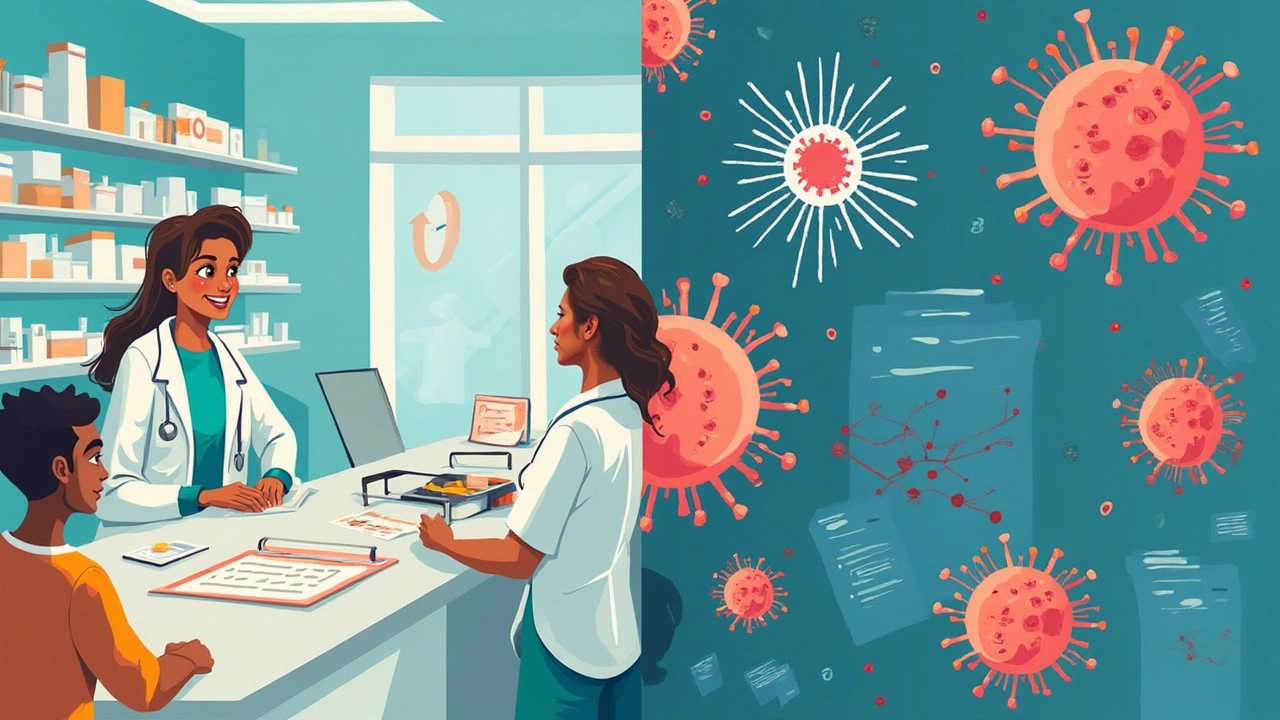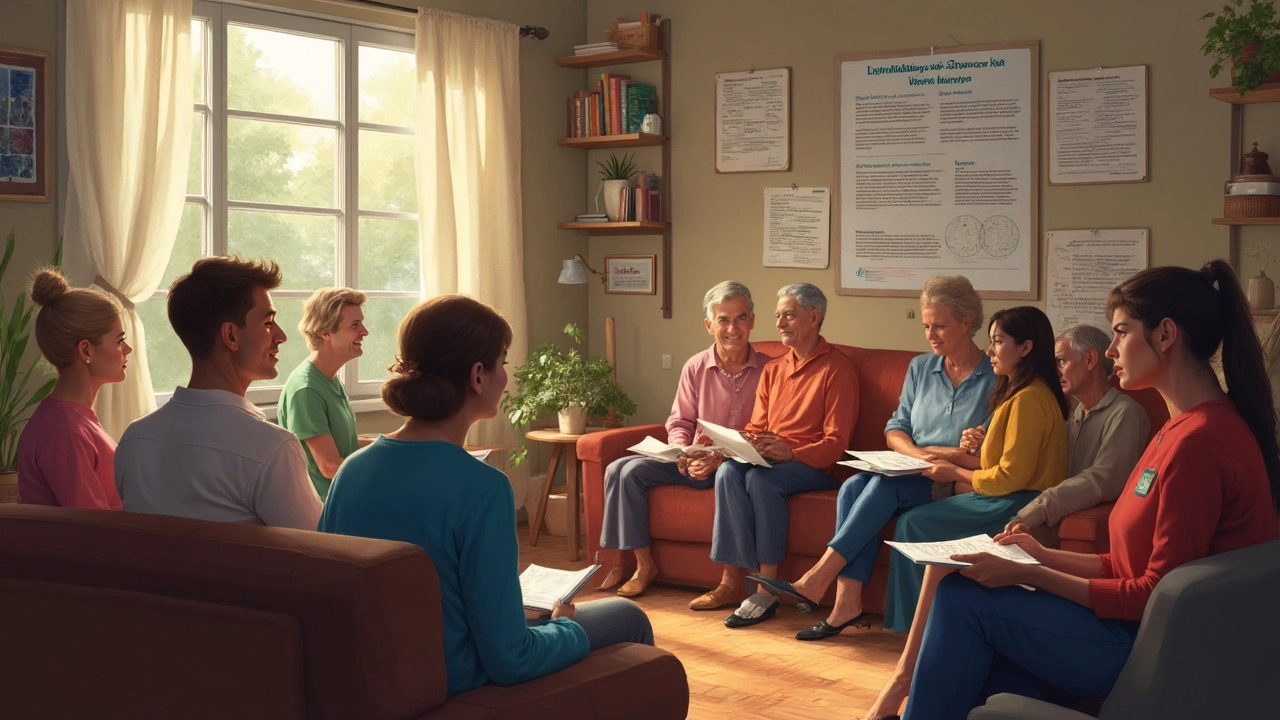Chlorthalidone and Cancer Risk: What the Research Really Shows
 Jun, 13 2025
Jun, 13 2025
If someone had told you fifteen years ago that your blood pressure medication might have a connection to cancer risk, you’d probably have just laughed. Fast forward, and now it’s hard to scroll through health news or forums without seeing someone mention chlorthalidone—an old-school diuretic best known for fighting high blood pressure—being tangled up in cancer debates. So what’s really going on? Are you right to be worried every time you pop that tiny white pill, or is all the online buzz just noise?
What is Chlorthalidone, and Why Do People Care?
Let’s get the basics out of the way first. Chlorthalidone isn’t new. It’s been around since the 1960s, and doctors love it because it’s reliable, cheap, and keeps blood pressure in check. Technically, it’s a thiazide-like diuretic, meaning it helps your kidneys get rid of salt and water, nudging down fluid in your body and, you guessed it, dropping your blood pressure. Millions of people in the US take it every day, and if your family has a little container marked “BP meds,” there’s probably some chlorthalidone in there already.
But it’s not just a favorite because it works; chlorthalidone also sticks around in your system for a long time. One pill can keep working for up to three days. That’s great for sustained blood pressure control, but when a drug hangs around that long, people naturally start wondering about long-term effects—good or bad. Cancer? That’s the biggest, scariest question.
Why is cancer even linked to this drug, though? The main theory traces back to the way diuretics like chlorthalidone can cause changes inside the body—especially with electrolytes, hormones, and even the skin’s response to sunlight. Some early studies raised eyebrows because they noticed a possible uptick in certain kinds of cancers, like skin or kidney. But notice that word: “possible.” The connection isn’t clear-cut, and for every study waving a red flag, there’s another suggesting things are fine.
Still, the idea that a little blood pressure pill could mess with your cancer risk makes it a hot topic. People care—because nobody wants their fix for one problem to land them in even deeper trouble. Health is already complicated enough.

The Research: Separating Facts from Fear
If you’re hoping for one solid answer, sorry—science loves shades of gray. Dive into the research on chlorthalidone and cancer, and you’ll find a mixed bag, but let’s break it down by what’s actually in the data, not just the scary headlines.
Back in the early 2010s, some studies from Denmark and Sweden started the chatter. Researchers there looked at huge health databases and noticed that people on thiazide diuretics (including chlorthalidone) seemed to show a higher rate of non-melanoma skin cancers, especially squamous cell carcinoma. The theory was that because chlorthalidone can make the skin more sensitive to sunlight, long-term exposure could raise the risk. But, and it’s a big but, these studies had trouble separating the effect of the drug itself from other factors—like who’s more likely to need blood pressure medicine, and the fact that older people, who already have a higher risk of skin cancers, are the main ones taking these meds.
Switch over to the US, and you get another twist. The famous ALLHAT study—the Antihypertensive and Lipid-Lowering Treatment to Prevent Heart Attack Trial—tracked over 30,000 people taking chlorthalidone or other blood pressure drugs. Researchers combed through years of data and didn’t find a jump in overall cancer risk among chlorthalidone users. Same story when it comes to other big studies in Canada and the UK. They found no major red flags.
But wait, there’s more. Some follow-ups to those European skin cancer studies suggest that the increased risk—while real—is tied mostly to high doses over many years, and even then, the absolute risk jumps only a little. For someone who spends lots of time in the sun, smokes, or has a family history of skin cancer, being careful makes sense. For everyone else? The risk looks less dramatic than some headlines make it out to be.
It’s important to remember: doctors weigh risk versus benefit every time they write a prescription. For people with high blood pressure, keeping that under control reduces the risk of heart attack, stroke, and kidney failure—all of which are way more likely to hurt you than a tiny uptick in skin cancer risk. Recent reviews from the American Heart Association and several European health agencies agree: chlorthalidone is safe for most people, with a side-eye toward skin cancer if you’re super high risk.
Let’s touch on kidney and bladder cancer for a second. Some news stories lump all diuretics together, but when you dig into the details, chlorthalidone isn’t the main concern. Other diuretics—especially those not used for blood pressure—sometimes show weak links, but researchers haven’t found solid proof that chlorthalidone by itself raises your odds of getting those types of cancer.
The big takeaway? Most large, careful studies haven’t found chlorthalidone blowing up your cancer risk. The one exception is a small possible rise in non-melanoma skin cancers, mainly in people taking high doses for lots of years. For everything else, the risk looks super low.

Staying Safe: Real-Life Tips for Anyone Taking Chlorthalidone
All this science talk is great, but what does it mean if you take chlorthalidone every morning? Here’s the part that matters most: you don’t have to panic, but there are some smart steps to feel even safer.
First up—don’t stop your medication without chatting with your doctor. Blood pressure control is too important to just go cold turkey. The risks of uncontrolled blood pressure are way worse than any possible increase in skin cancer risk from chlorthalidone. If you’re worried, bring it up at your next checkup. Your doctor can help weigh the pros and cons for your specific health situation.
But you can take matters into your own hands, too. The biggest practical concern—skin sensitivity—means you should already be thinking about sun safety. Here’s what experts recommend if you’re taking chlorthalidone:
- Use sunscreen with at least SPF 30 every day, even if it’s cloudy.
- Wear hats, long sleeves, and sunglasses when you’re outside, especially during peak sun hours.
- Check your skin once a month for new or changing spots. If anything looks weird, see a dermatologist. Early treatment for skin cancer is usually simple and effective.
- Don’t forget to tell your doctor about any family history of skin cancer, or if you’ve ever had a suspicious mole removed in the past.
If you live somewhere super sunny—think Arizona or Florida—these steps matter even more. And if you notice your skin reacting more than usual, ask your doctor if switching to a different diuretic might help, especially if you’re dealing with chronic rashes or sunburns. Sometimes just lowering the dose makes a difference.
There’s one more angle worth mentioning—lifestyle tweaks that work with your meds to lower your overall cancer risk. Eating more fruits and veggies, cutting back on red meat and processed foods, getting a bit of exercise, and skipping the tanning bed add up. You lower your cancer risk and help your blood pressure all in one go. It’s not magic, but it helps.
To sum things up: chlorthalidone still has a strong reputation as a safe, cheap, and effective blood pressure med. Most people can use it without fear. If you’re on it, use your common sense—protect your skin, stick with regular checkups, and don’t let dramatic headlines scare you into ditching something that could be saving your heart. Science keeps digging into the details, but right now, the smart money is on chlorthalidone being a solid choice for blood pressure with only a little risk for skin cancer—and even then, only for some. You can take steps to stay healthy while still getting the benefits. Now, doesn’t that feel a little less scary?
Holly Lowe
June 14, 2025 AT 11:12Okay but can we talk about how chlorthalidone is basically the unsung hero of hypertension meds? Like, yeah, it’s old-school, but it’s got the staying power of a Netflix binge and the results of a personal trainer who doesn’t take weekends off. Skin cancer risk? Sure, maybe a tiny bit if you’re sunbathing like it’s a job-but that’s on you, not the pill. Protect your skin, not your denial. 🌞💪
Cindy Burgess
June 16, 2025 AT 06:07The empirical evidence does not substantiate a statistically significant causal relationship between chlorthalidone administration and carcinogenesis in the majority of longitudinal cohorts examined. The confounding variables, particularly age and photodamage, remain inadequately controlled in the literature cited.
Tressie Mitchell
June 16, 2025 AT 07:26Of course the average person is panicking about a 0.2% increased risk of squamous cell carcinoma-because apparently, we’ve forgotten how to read a p-value. If you’re taking chlorthalidone and not wearing SPF 50 daily, you’re not a patient-you’re a liability to dermatology.
dayana rincon
June 18, 2025 AT 03:52so like… i take this pill and i still got my tan? 🤔 maybe the real cancer risk is scrolling health threads at 2am 😴
Orion Rentals
June 19, 2025 AT 06:40It is imperative to underscore that the benefit-risk calculus strongly favors the continued use of chlorthalidone in hypertensive patients, particularly given the overwhelming reduction in cardiovascular morbidity and mortality demonstrated in large-scale trials such as ALLHAT. The potential for non-melanoma skin cancer remains a minor, dose-dependent, and modifiable concern.
Sondra Johnson
June 20, 2025 AT 11:24Look, I get the fear-meds are scary when they’re in your body for decades. But here’s the thing: if you’re on chlorthalidone and you’re not checking your skin monthly like it’s a Netflix episode you’re obsessed with, you’re doing it wrong. It’s not about fear. It’s about being a detective for your own body. And honestly? That’s kind of hot.
Chelsey Gonzales
June 21, 2025 AT 12:16chloorthalidone?? i thought it was chlorthaladone?? anyway i’ve been on it 8 yrs and my skin’s fine, my bp’s perfect, and i still do yoga. so… maybe the internet is just drama? 🤷♀️
MaKayla Ryan
June 21, 2025 AT 16:22Of course the government lets this drug stay on the market. They don’t care about Americans. You think they care if you get skin cancer? They care about Big Pharma profits. Wake up. This is a slow poison disguised as a solution.
Kelly Yanke Deltener
June 22, 2025 AT 00:42I’ve been on this since 2015 and I swear it’s the reason I look so tired. My skin is dry, my mood is off, and now you’re telling me I might get cancer? I just wanted to live. Why does everything have to kill me?
Sarah Khan
June 22, 2025 AT 07:52The human body is not a machine with a single point of failure. Chlorthalidone alters fluid dynamics, electrolyte gradients, and dermal photosensitivity-not to induce cancer, but as an emergent property of its pharmacokinetic profile. The risk is not inherent, it is contextual. It is not a villain, it is a variable. And like all variables, it must be measured against the baseline of human mortality-where stroke and myocardial infarction remain the dominant threats. To fear the diuretic is to misunderstand the nature of risk itself. We live in a probabilistic world. The question isn’t whether harm exists-it’s whether the harm you avoid outweighs the harm you accept.
Kelly Library Nook
June 22, 2025 AT 16:26It is statistically irresponsible to equate observational epidemiological findings with causal inference. The Danish cohort studies cited exhibit significant selection bias, inadequate adjustment for UV exposure, and failure to account for concomitant medication use. The ALLHAT trial, by contrast, employed rigorous randomization and long-term follow-up-yielding null results. To suggest otherwise is to misrepresent the scientific consensus.
Crystal Markowski
June 24, 2025 AT 00:39You’re not alone in feeling uneasy about this. I’ve been on chlorthalidone for 12 years and I used to stress over every little article. Then I started seeing my dermatologist every six months, wearing sunscreen like it’s my job, and focusing on what I can control. That’s the real win-not fear, but awareness. You’ve got this.
Charity Peters
June 25, 2025 AT 23:10Just take the pill. Wear sunscreen. Don’t die. Simple.
Faye Woesthuis
June 26, 2025 AT 05:14If you’re taking chlorthalidone and not wearing SPF 50, you’re an idiot. No exceptions. No excuses. You’re not a patient-you’re a walking liability.
raja gopal
June 27, 2025 AT 18:31I’m from India, and here we don’t even know what chlorthalidone is. We use hydrochlorothiazide. But I read this and I feel you. My uncle took BP medicine for 20 years and he’s still hiking mountains. Don’t let fear stop you. Stay smart, stay safe.
Samantha Stonebraker
June 28, 2025 AT 03:48There’s something deeply human about how we turn medical facts into horror stories. We’re not afraid of the pill-we’re afraid of being powerless. But you’re not powerless. You check your skin. You wear sunscreen. You talk to your doctor. That’s not weakness. That’s wisdom in motion.
Kevin Mustelier
June 28, 2025 AT 05:29Chlorthalidone? More like Chlorthalido-nope. I mean, if you’re gonna live in a country where the sun is basically a laser and the healthcare system is a horror movie, maybe you should’ve just eaten more kale. 🤷♂️
Keith Avery
June 29, 2025 AT 06:05Everyone’s missing the point. Chlorthalidone isn’t the problem-it’s that the FDA approved it in 1960 without double-blind cancer studies. That’s not science, that’s negligence. And now you’re all just parroting ALLHAT like it’s gospel. Wake up. The real study was funded by the same pharma that makes the drug.